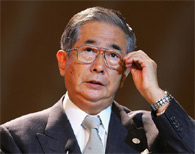The Human Rights Watch issued a statement on Feb 1, 2011:
The governor of Tokyo, Shintaro Ishihara, should immediately retract his recent statements denigrating lesbians and gay men, Human Rights Watch said today.

On two separate occasions in December 2010, Ishihara made comments criticizing the representation of homosexuals in the media and categorizing lesbians and gay men as “deficient” and genetically lacking. The statements were made just before and during Japan's Human Rights Awareness Week, which ended December 10, and were carried in regional and national media as well as widely disseminated on the Internet.
“Although Japan does not criminalize homosexual conduct, lesbians, gay men, and transgendered people face everyday discrimination and humiliation from their families, in the workplace, and in other social and professional settings,” said Dipika Nath, lesbian, gay, bisexual, and transgender (LGBT) rights researcher at Human Rights Watch. “Governor Ishihara's comments increase the stigma against lesbian and gay people and can promote discrimination against an already marginalized group.”
Ishihara made his first comments on December 3, discussing a revision to the Tokyo Metropolitan Ordinance Regarding the Healthy Development of Youths that was aimed at regulating the manga and anime industries, which went on to pass on December 15.

“[The bill] is not just about the kids,” he said. “We have got homosexuals casually appearing even on television. Japan has become far too untamed.” Mainichi Shimbun, a major national daily, carried the governor's statement, including in its online edition.
On December 7, in response to a journalist's question about his earlier statement, Ishihara said, “I think homosexuals have something missing from them somehow. It may be something genetic. I feel sorry for them being a minority.” He spoke of watching a gay parade in San Francisco: “I saw a parade made up of gays, and I really felt sorry for them. There were pairs of men and women, but it certainly did feel like they were deficient somehow.” These statements were reported in several newspapers as well as by online media.
In 2000, following successful litigation by the Tokyo-based LGBT rights group OCCUR, Ishihara drafted the Tokyo metropolitan government’s first set of guidelines on a policy for the protection and promotion of human rights. The guidelines pledge to protect and promote human rights, including the rights of transgender people and homosexuals. This is one of the few measures that recognize the human rights of lesbians, gay men, and transgender people in Japan.
“Governor Ishihara should put his good faith and word behind the Tokyo guidelines and make sincere efforts to counteract prejudice and discrimination against all marginalized groups,” Nath said. “Lesbians, gay men, and transgender people deserve the same respect and rights as everyone else in Japan.”
The Japanese constitution promises equal rights and is interpreted to prohibit discrimination on all grounds. However, existing legislation, such as article 23(1) of the Public Housing Law, effectively bars same-sex couples' access to public housing.
Japan is a party to the United Nations International Covenant on Civil and Political Rights (ICCPR), which also comprehensively bans discrimination. At its ninety-fourth session in 2008, the Human Rights Committee, the body that monitors states' compliance with the ICCPR, recommended that, to fulfill its treaty obligations, Japan should amend the public housing law and other discriminatory legislation and include sexual orientation among the prohibited grounds for discrimination. Japan has yet to take any steps in this regard despite the clear need for a comprehensive anti-discrimination law that addresses the multiple rights violations faced by the LGBT community and other minority groups.
“It is a matter of great concern that Governor Ishihara, who is charged with upholding the rights and ensuring the well-being of all Tokyo residents, has characterized lesbians and gay men as somehow lower than other persons,” Nath said. “When public officials make pejorative characterizations of particular groups of people, they can compromise people's ability to live their lives with dignity. It is the governor’s responsibility to undo the damage he has caused.”











 Printable Version
Printable Version










Reader's Comments
Why publish this article, if you don't want me... others... to take action...
get real!!!!!!
duh!
have you seen his photo...!?
i think hes the one lacking GOOD genetics...
Urm, so what exactly constitutes "tame Japan" in yr eyes,
Isihara-san??? Do take note: Japan nationalist hero and role-model Yukio Mishima was one of those you "felt sorry for"...douchebag.
For those here who might be interested in learning about the history of homosexuality in Japan, please read "Male Colors- the construction of homosexuality in Tokugawa Japan."
The author of this scholarly historical text points out that "It is no secret to any careful student of Japanese society in the Tokugawa period (1603-1868) that male homosexuality was extremely common. Sex between males was not only widely tolerated among the articulate classes, but positively celebrated in popular art and literature. Homosexual behavior was formally organized in such institutions as samurai mansions, Buddhist monasteries and male brothels. It was, indeed, a salient feature of mainstream culture.
A man in Tokugawa Japan would more likely have been asked why he did not have a male lover than why he did."
Please log in to use this feature.